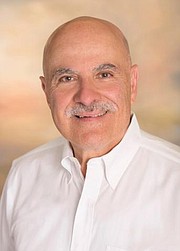Optional Forms struggle looks dead
COEUR d’ALENE — Kootenai County voters likely won’t get the final say in whether the county’s administrative structure changes, after the Optional Forms of Government Study commission rescinded its original recommendation.
Commissioner Bill Brooks said he believes Tuesday’s reversal is politically motivated and part of a larger effort to keep changes to the county’s form of government off the ballot.
“Those thugs want to deny the rest of the county an opportunity to express their opinion,” Brooks said Wednesday, referring to a group of residents who attended the weekly study commission meetings and heckled the members. “I have a problem with that.”
The study commission voted 5-4 last November in support of increasing the size of the Board of County Commissioners from three to five members, as well as switching to the commission manager form of government.
Under that form, the commission manager handles administrative work that otherwise falls to commissioners and serves as chief budget officer, a role currently filled by the county clerk.
The study commission also recommended the county clerk, treasurer, assessor, sheriff, coroner and prosecuting attorney remain elected positions, rather than hired.
All recommendations are allowed under Idaho Code 31-5001.
Dave Botting, Dave Levine, Phil Ward, Bob Fish and Kristen Wing voted in favor of the original recommendation.
Bryant Bushling, Brian Cleary, Kurt Andersen and Tamara Bateson voted against it.
The group formally submitted its recommendations to the BOCC on March 10.
County commissioners were poised to decide whether to put the matter on the November ballot when an alleged violation of Idaho’s Open Meeting Law halted the process.
Coeur d’Alene resident Don Warner alleged the study commission violated Idaho’s Open Meeting Law in the weeks before it submitted its final recommendation.
In late February, the group formed a three-person subcommittee to write the final report that would go before county commissioners.
The subcommittee reportedly shared drafts with other members for feedback during the writing process. No public meetings occurred during that time.
It remains unclear whether a violation occurred.
Earlier this month, several members of the commission also questioned whether Kristen Wing remained eligible to serve, as they believed she had established legal residency in South Dakota.
To become a resident of South Dakota, an individual has to stay one night in the state and obtain a driver’s license.
Wing reportedly obtained a South Dakota driver’s license on March 2, about a week before the study commission voted to approve the final recommendation.
Under Idaho law, study commission members must be at least 21 years old and must reside in the county for at least one year before they are appointed.
Idaho Code 31-5103 states that a commission member’s term of office “initiates upon his appointment and concludes thirty (30) days after the issuance of the commission’s final report.”
The statute makes no mention of residency requirements after a member’s appointment.
For that reason, Botting argued that Wing remained a legitimate member of the commission.
Still, Wing resigned from her position on April 5.
She was replaced by Joan Genter, an alternate.
Genter cast the deciding vote to rescind the original report and instead recommend no changes to Kootenai County’s form of government.
Prior to the reversal, a motion to remove Botting as chair of the study commission failed. Several members cited concerns about transparency, as well as Botting’s temperament, as reasons for the motion.
“If at any time the chair steps out of bounds, and even says something resembling an insult, the chair is supposed to step aside,” Tamara Bateson said. “And I, amongst others, have been the brunt of that.”
Though five members voted in favor of Botting’s removal, the group’s bylaws require a supermajority vote in order to remove the chair.
Despite the pushback against the original proposal, Botting said he still believes the commission manager form of government is better for the people of Kootenai County than the current form.
He said Kootenai County residents deserve to choose for themselves, even if they disagree.
“I would like to see the voters be given the opportunity to decide what kind of government they want, rather than a small, vocal, intimidating band trying to decide for them,” Botting said.
Brooks said that as far as he’s concerned, the final report submitted March 10 is the only valid one.
“We received the final report quite some time ago,” he said. “Now we’re getting the final-final report.”
He accused the proposal’s opponents of “wanting a second bite at the apple” and described their tactics as “extralegal,” in a gray area outside the law.
“What are they afraid of?” he said Wednesday. “They’re afraid the general public might make a change for the better.”
Commissioner Leslie Duncan said Wednesday via email that Kootenai County’s form of government isn’t the problem. Rather, she said, it’s the people in government who determine positive or negative outcomes for county residents.
She said she thinks 2021 was the “worst possible time” to examine the county’s administrative structure.
“After the uncertainty and the shutdowns in 2020 due to the pandemic, the last thing citizens needed to be concerned about was once again having less representation or more rights taken away from them,” she wrote.
Duncan has previously said she opposes letting Kootenai County voters decide whether the form of government should change.
Commissioner Chris Fillios said expanding the BOCC from three full-time members to five part-time commissioners would save money and increase representation.
It would also dilute the power of individual commissioners and help insulate the county from “falling prey” to any particular political force, he said.
Being a Kootenai County commissioner is a full-time job and then some, Fillios said.
That structure makes serving as a commissioner inherently more accessible to people who are retired or don’t need to work for other reasons.
Part-time positions would enable a wider range of people to run, he said, including younger people who work full-time.
“We’re locking out good people who could serve the community and still have a career,” he said.
Fillios described the yearlong study process as “tortured” and said he preferred the previous recommendation.
“In the final analysis, the people are deprived of the right to choose their government,” he said. “But that is the report. What can we say? That’s the conclusion.”





